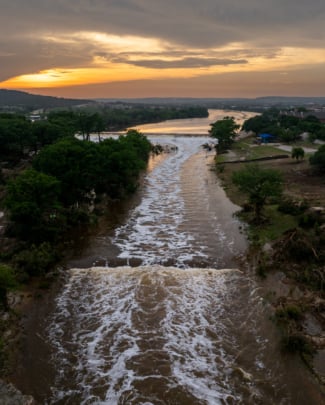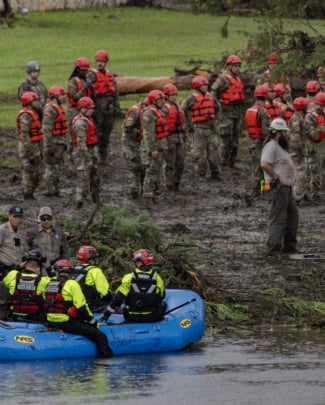In Texas, The Border Crisis Threatens To Become A Constitutional Crisis
Activists Call for Garland’s Resignation Over Leaked FBI email
Parents Suppressed and Criminalized By School Boards
The Metaverse: Digital World or Digital Deception?
Why The FBI Whistleblower Documents Are So Important
In Texas, The Border Crisis Threatens To Become A Constitutional Crisis
What happens in border states when the federal government refuses to enforce immigration laws amid a record surge of illegal immigration? Are those states, and the elected officials charged with maintaining law and order in them, supposed to stand back and accept the ensuing chaos in their communities? Or do they have a right, even a duty, to take action and fill the void left by the federal government?
In Texas, where the border crisis that began as soon as President Biden took office is still in full swing, the answer appears to be that in the face of federal inaction, states must act on their own.
That’s the idea behind “Operation Lone Star,” Gov. Greg Abbott’s evolving and expensive plan to secure the U.S.-Mexico border using thousands of state troopers and Texas National Guardsmen. The operation, launched in March, was initially billed by Abbott as an effort to “deny Mexican Cartels and other smugglers the ability to move drugs and people into Texas,” but has since become a sprawling and controversial experiment in the use of state power to secure an international border.
Democrats have denounced it as illegal and unconstitutional, and called for a Justice Department investigation. Republicans have praised Abbott for taking a stand and pushing the envelope.
Abbott has not asked the Biden administration for permission because he does not believe he needs it. Indeed, the entire operation has been designed to operate exclusively with state resources and agencies, and within the existing confines of state law. That’s both a strength of Abbott’s approach and, as I saw for myself in Del Rio, Texas, a major weakness.
Abbott’s Border Operation Is A Bureaucratic Morass
It’s a weakness because it severely limits what the operation can achieve. The basic idea is that Texas state troopers and National Guard troops will arrest illegal immigrants, who will in turn be prosecuted for misdemeanor criminal trespass in hopes that such prosecutions will serve as a deterrent. Whatever the merits of this approach to border security, it comes with a host of caveats and constraints.
To begin with, Texas is only arresting single adult men, not women, children, or family units, which means the state is targeting the migrant population most likely to be quickly expelled to Mexico under Title 42, the pandemic public health order that allows federal immigration officials to send migrants back over the border with minimal processing. The migrant men arrested by Texas law enforcement, by contrast, will remain in state custody for weeks or longer, rather than being sent back to Mexico.
Up until last week, migrant men arrested under Operation Lone Star who posted bond would be transferred to Immigration and Customs Enforcement, which would typically expel them under Title 42. But last week ICE told the state it would no longer take custody of these migrants. That means Texas will have to transfer them to U.S. Border Patrol, and as of this writing it remains an open question whether Border Patrol will expel them as they would have under Title 42, had federal agents arrested them, or process them as asylum-seekers.
If the latter, then Operation Lone Star might have the unintended effect of rewarding migrants caught by state authorities: once they’re processed and released by Border Patrol to pursue their asylum claims, migrants have legal status, are allowed to work, and can remain in the United States as their case wends its way through federal immigration courts — a process that can take up to five years.
But even before these problems arise there are strict conditions that have to be met before state authorities can even make an arrest. Migrants can only be arrested on private land where landowners have agreed to press charges, and only on those parcels of land where the Texas National Guard has managed to erect temporary barriers, usually some arrangement of concertina wire that migrants must cut or go over, to ensure the trespass charges will stick.
And before Texas National Guardsmen in particular can arrest anyone, they’re supposed to go through 40 hours of police training (in practice, I’m told that it’s more like a day-long training). Also, the migrants who are arrested have to be transported to state prisons that have been retrofitted to comply with state jail standards, since migrants are being held in pretrial confinement. That in turn means all the corrections officers have to be trained as jailers.
On top of all these requirements, the entire operation depends on the willingness of local county attorneys to prosecute a deluge of misdemeanor criminal trespass cases arising from all these arrests. In Kinney County, which has a population of less than 4,000, the county attorney is a young man named Brent Smith who just took office in January and has never before worked as a prosecutor. He now has about 1,300 cases and counting thanks to Operation Lone Star. (For context, in normal times the Kinney County prosecutor would only take on a couple dozen cases per year.)
By contrast, in neighboring Val Verde County, the local prosecutor, David Martinez, a Democrat, has rejected nearly half the cases that have come through his office from Operation Lone Star. Last month, Martinez told a local news station he rejected the cases either because the migrants in question were seeking asylum or because there was some other problem with the case. (He cited one case in which state troopers re-directed a group of migrants to cross onto private property so they could arrest them for trespassing.)
For all this, out of about 1,500 criminal trespass cases filed since July through Operation Lone Star, only about 3 percent have resulted in convictions, according to a recent report by the Wall Street Journal, which also cited court records showing that of the 170 Operation Lone Star cases resolved as of November 1, about 70 percent were dismissed, declined, or dropped. The remaining cases ended in plea agreements, with most migrants sentenced to time already served.
Meanwhile, all of this is costing Texas hundreds of millions of dollars. Earlier this year, Abbott shifted about $250 million in the state budget to launch the operation, and the GOP-led state legislature later approved an additional $3 billion. In Del Rio, you can see these dollars at work all over town: every hotel parking lot is full of Texas state trooper trucks and SUVs. Uniformed National Guardsmen drive around in armored Humvees. Along some stretches of private land near the Rio Grande, sparkling new chain-link fencing topped by concertina wire stretches out for miles.
Locals seem to appreciate the effort and money being poured into their communities, especially landowners who feel betrayed and abandoned by the Biden administration. One woman told me her family’s ranch has been repeatedly vandalized this year by migrants — trashed, in fact, for the first time in generations. When they called Border Patrol, the answer came back that no one could be spared to come out and investigate. Their advice was, stay away from your ranch, or move. Their message was, incredibly, we can’t protect you.
Indeed, under the direction of Biden and Homeland Security Secretary Alejandro Mayorkas, Border Patrol has for the past ten months been overwhelmed with the endless task of processing and releasing migrants as fast as it possibly can, with little time or personnel available for patrolling the border. In Del Rio, I spoke to former Border Patrol chief Rodney Scott, who was forced out by the Biden administration in August, and he said agents are demoralized because they’re unable to do their jobs. Instead of intercepting drug and human traffickers or arresting criminals trying to evade detection — the actual job of Border Patrol agents — they’re stuck processing and transporting asylum-seekers.
Scott sees the border as a “national security issue,” but says the Biden administration has a completely different set of priorities. “Unfortunately since January 20, I haven’t seen a single action or even a single conversation while I was still in the chief’s position, to try to slow the flow to actually create a deterrent to illegal entry,” he says. “Every single action has been to basically be more welcoming. How can we process faster? And that’s just going to continue to be an invitation worldwide.” . . .
What could change that? Texas could. Abbott could. He has already demonstrated an impressive ability to mobilize and deploy thousands of Texas law enforcement and military personnel, along with every manner of vehicles, barriers, and transports. Nothing like Operation Lone Star has ever been undertaken, yet it is too little, too late — too pinched and small-minded a response to a rolling crisis that now appears to be permanent.
Abbott could wield these tools to press the constitutional question about what border states can do when the federal government leaves them to their own devices. If he doesn’t, he might find the people of Texas are ready to listen to someone who will.
What do you think about this border crisis? Let us know in the comments below!
(Excerpt from The Federalist. Article written by John Daniel Davidson. Photo by UnSplash.)
Partner with Us
Intercessors for America is the trusted resource for millions of people across the United States committed to praying for our nation. If you have benefited from IFA's resources and community, please consider joining us as a monthly support partner. As a 501(c)3 organization, it's through your support that all this possible.


We use cookies to ensure that we give you the best experience on our website. If you continue to use this site we will assume that you are happy with it. Privacy Policy





Comments
No comments have been posted yet; you can be the first!